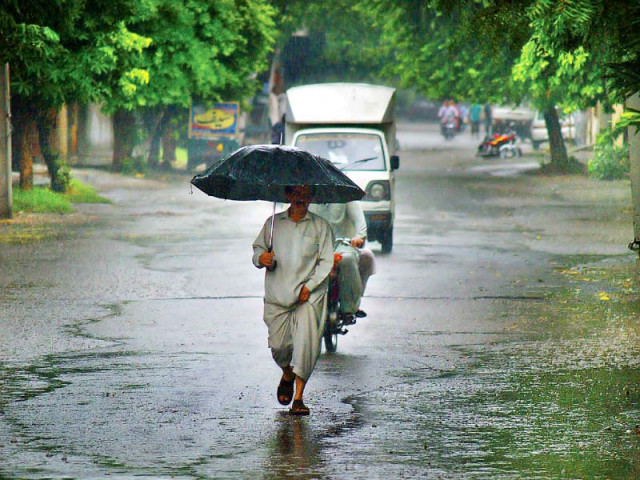Threat of flood looms large over Punjab
CM to direct 1% of all developmental budgets towards environment-friendly activities, says Shah

Punjab gets relief from scorching heat by receiving fair share of pre-monsoon showers. PHOTO: ABID NAWAZ/EXPRES
While speaking to The Express Tribune, Environment Protection Department’s focal person Nasimur Rehman Shah, said, “Even though our contribution towards the global net pollution is merely 0.8, Pakistan still stands on the list of the ten countries most vulnerable to climate change.”
Emergency Response Plans: ‘Prepare for flood contingencies’
Nasim said that in order to tackle the situation, lawmakers passed the Climate Change Act 2017 to meet the country’s obligations under international conventions related to climate change and its effects.
He said the formulation of a climate change policy was underway in Punjab and a commission was already working on the matter. “While a lot of other issues will be addressed, one of the salient features of the policy is to stress on extensive tree plantation,” Shah said.
Moreover, the Punjab chief minister decided to direct 1% of the budgets of all development programmes towards environment-friendly activities, he said.
Shah added public and private sector organisations were being encouraged to take tree plantation initiatives seriously, especially in urban areas.
He added that in order for people to play their part, there was a need to shift industries from conventional and unsustainable energy sources to environment-friendly ones.
The focal person stressed that even though steps were being taken in the right direction, there was a need to escalate environmental policies into quick actions.
He emphasised the need to adopt international environmental standards and sensitise school children on climate change to mitigate its effects.
PDMA Punjab prepared to cope with upcoming rains, floods
According to the World Bank’s South Asia Climate Change Strategy report in 2009, the poorest people in the region would suffer the most from climate change because of unfavourable geography, limited assets and greater dependence on climate-sensitive income sources. Moreover, experts directly associated the frequent occurrences of extreme weather in the region, such as flash floods, with climate change.
Meanwhile, in its press release, the Pakistan Meteorological Department advised all departments concerned to remain alert as heavy rains might generate flash floods in vulnerable areas, particularly those lying around storm drains in K-P, Pothohar, Gujranwala, DG Khan and Kashmir.
Recent predictions further confirmed that weather patterns were most likely to remain unusual and in some cases extreme, displaying extreme patterns such as causing flash floods in northern Punjab and K-P. These patterns could also trigger drought like conditions in the southern part of the country.
Published in The Express Tribune, July 2nd, 2017.



















COMMENTS
Comments are moderated and generally will be posted if they are on-topic and not abusive.
For more information, please see our Comments FAQ